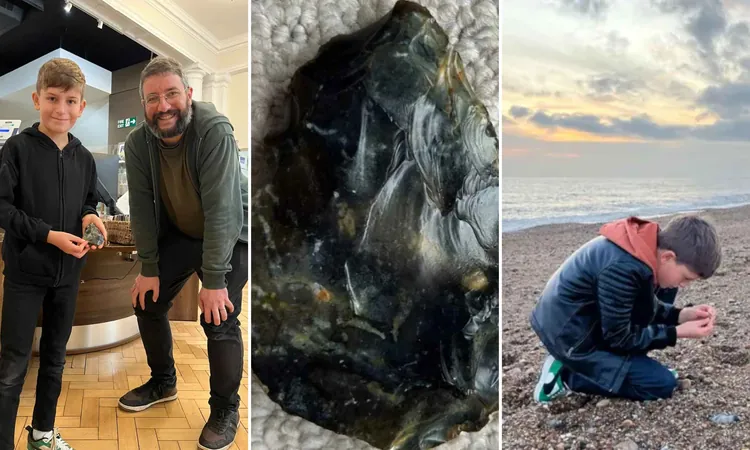
Young Boy Uncovers 60,000-Year-Old Neanderthal Hand Axe on Beach Adventure!
2025-01-22
Author: Ling
When Ben was just six years old, he made a remarkable find while playing on Shoreham Beach in West Sussex—a shiny rock that stood out among the countless stones scattered along the shore. Intrigued, he decided to keep it as a souvenir, unaware that this unassuming piece of flint was linked to our ancient ancestors.
The Spark of Curiosity
After three years of misplacing and rediscovering the rock, he visited Worthing Museum at the age of nine. There, he noticed displays of Stone Age artifacts that bore a striking resemblance to his own find. It struck him that his "shiny rock" might be an archaeological treasure. Museum experts confirmed his intuition, identifying his find as a rare Neanderthal hand axe dating back an impressive 40,000 to 60,000 years.
A Glimpse into Neanderthal Life
Worthing Museum has proudly placed Ben’s hand axe on display, offering visitors a fascinating look into the lives of Neanderthals who inhabited Europe and parts of Asia. The exact origins of the axe remain uncertain; it may have been left on the beach thousands of years ago or excavated during coastal maintenance.
These incredible tools were critical for survival, used for tasks like butchering animals and cutting wood—skills that were vital for Neanderthals and give us a glimpse into their resourcefulness and adaptability.
The Unearthed Treasure
Reflecting on his discovery, Ben shared, “I was looking around and I saw this shiny flint rock. It just looked different from all the other pebbles and stones.” He noted the museum staff hailed it as "the best find in a decade," further heightening his excitement. His mother, Emma, added, “Seeing how it lit up the face of the archaeologist at the museum, it’s great that others can enjoy it.” Although initially wanting to keep his treasure, Ben recognized its significance and chose to share it for public appreciation.
Why This Axe is Special
The rarity of such a well-preserved tool from the Late Middle Palaeolithic era makes Ben’s axe extraordinary. The craftsmanship displayed by Neanderthals showcases their selective use of high-quality flint and their skillful shaping techniques. Each subtle flake pattern tells a story of the lives they lived and the challenges they faced.
Expert archaeologists point out that this specific artifact contributes significantly to our understanding of Neanderthal life, especially considering how infrequently such items are displayed in public collections.
Connecting with Our Ancestors
Ben’s decision to donate his find highlights the vital role museums play in preserving our heritage. Artifacts like these allow us to connect with the ancestors who laid the groundwork for the modern world, adapting to climatic changes and evolving survival strategies.
Inspiring Future Generations
While most children might dig up pebbles or shells during beach outings, Ben's experience serves as a reminder of how curiosity can lead to groundbreaking discoveries. This adventure may inspire him to delve deeper into the realms of history and science, igniting a lifelong passion for exploration.
Responsible Collecting and Preservation
As exciting as beachcombing can be, it’s crucial for the public to adhere to local guidelines on collection. Experts recommend consulting with museums when stumbling upon unusual or potentially significant artifacts. Properly identifying these items ensures their historical value is preserved and studied, preventing potential losses to the annals of history.
The Legacy of Ben's Discovery
Ben's incredible encounter with a Neanderthal tool is more than just a personal victory; it's a narrative that emphasizes the importance of curiosity and exploration. The flint axe now resides safely at Worthing Museum, inviting future visitors to ponder the lives of Neanderthals who lived in a dramatically different time.
Ben's story serves not only as an enchanting tale of discovery but also a tribute to our distant relatives and their enduring impact on human history. Will this childhood adventure turn into a lifelong quest for knowledge? Only time will tell!




 Brasil (PT)
Brasil (PT)
 Canada (EN)
Canada (EN)
 Chile (ES)
Chile (ES)
 Česko (CS)
Česko (CS)
 대한민국 (KO)
대한민국 (KO)
 España (ES)
España (ES)
 France (FR)
France (FR)
 Hong Kong (EN)
Hong Kong (EN)
 Italia (IT)
Italia (IT)
 日本 (JA)
日本 (JA)
 Magyarország (HU)
Magyarország (HU)
 Norge (NO)
Norge (NO)
 Polska (PL)
Polska (PL)
 Schweiz (DE)
Schweiz (DE)
 Singapore (EN)
Singapore (EN)
 Sverige (SV)
Sverige (SV)
 Suomi (FI)
Suomi (FI)
 Türkiye (TR)
Türkiye (TR)
 الإمارات العربية المتحدة (AR)
الإمارات العربية المتحدة (AR)